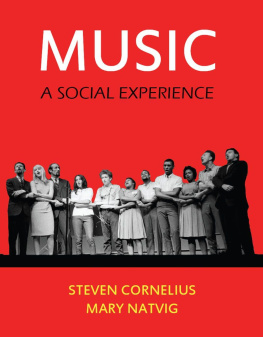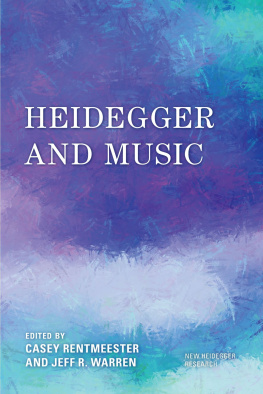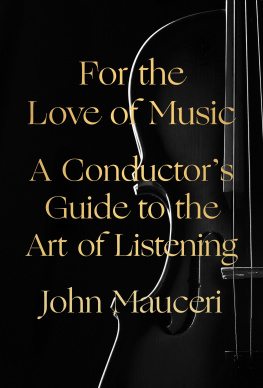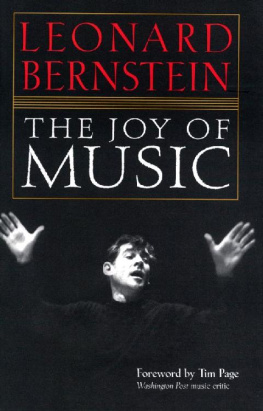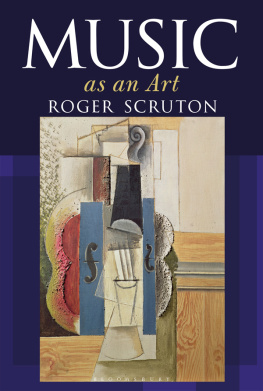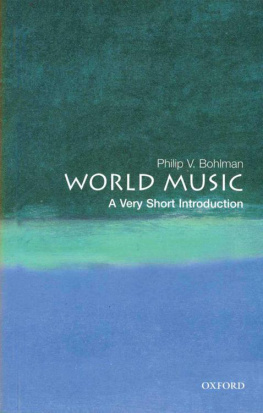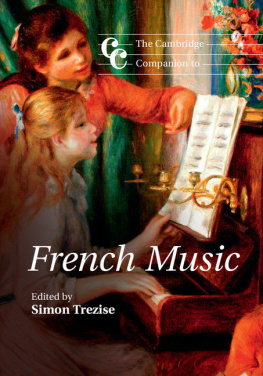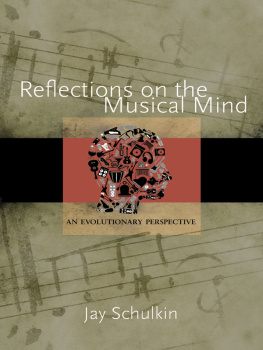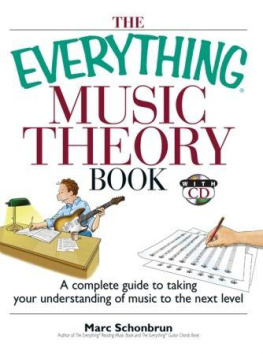LIST OF RECORDINGS


MUSIC
A Social Experience
Steven Cornelius
Boston University
Mary Natvig
Bowling Green State University

First published 2012 by Pearson Education, Inc.
Published 2016 by Routledge
2 Park Square, Milton Park, Abingdon, Oxon OX14 4RN
711 Third Avenue, New York, NY 10017, USA
Routledge is an imprint of the Taylor & Francis Group, an informa business
Copyright 2012 Taylor & Francis. All rights reserved.
All rights reserved. No part of this book may be reprinted or reproduced or utilised in any form or by any electronic, mechanical, or other means, now known or hereafter invented, including photocopying and recording, or in any information storage or retri eval system, without permission in writing from the publishers.
Notice:
Product or corporate names may be trademarks or registered trademarks, and are used only for identification and explanation without intent to infringe.
Cover Photo: In this famous photograph, a group of the leading folk singers and Civil Rights Activists joined hands to sing We Shall Overcome, in 1963. Left to right: Peter Yarrow, Mary Travers, and Noel Paul Stookey (Peter, Paul, and Mary); Joan Baez; Bob Dylan; Bernice Johnson Reagon, Cordell Hull Reagon, Charles Neblett, and Rutha Mae Harris (The Freedom Singers); and Pete Seeger. AF archive / Almay
Credits and acknowledgments borrowed from other sources and reproduced, with permission, in this textbook appear on appropriate page within text.
ISBN-13: 978-0-13-601750-9 (pbk)
Cover Designer: Suzanne Behnke
Library of Congress Cataloging-in-Publication Data
Cornelius, Steven
Music : a social experience / by Steven Cornelius and Mary Natvig.
p. cm.
ISBN-13: 978-0-13-601750-9
1. Music appreciation. 2. MusicSocial aspects. I. Natvig, Mary II. Title.
MT90.C69 2012
781.1'7dc23
2011030098
Dedications
To James Latimer
Steven
To Bill Engelke
Mary
CONTENTS
To the Students
Welcome to Music: A Social Experience, a new approach to learning about music. This text is based on two simple premises:
We learn best by building on what we already know.
Musical meaning unfolds through a web of social interactions.
Music: A Social Experience takes advantage of these simple truths by beginning with familiar pieces or concepts, then expanding outward to more distant musical traditions and cultural contexts. By focusing on the social aspects common to all music, we engage with a wide range of musical styles, cultures, and historical periods.
This approach makes for dynamic juxtapositions. In our chapter on music and politics, for example, Jimi Hendrixs Woodstock performance of The Star Spangled Banner opens a pathway to understanding the reception history of Ludwig van Beethovens Symphony No. 9. The chapter on music and gender discusses songs of the 1960s then looks at issues of social empowerment in George Bizets 1875 opera Carmen.
Our goals are to:
Present ways of listening to and thinking about music from a variety of time periods and cultures.
Promote cultural understanding through musical knowledge.
Reveal musics relationship to the individual and to the human condition.
Encourage self-reflection and critical thinking.
Rather than according a higher value to one type of music over another, Music: A Social Experience demonstrates the role that all music plays in teaching us about ourselves and the world in which we live.
Why should we study Western art music?
Art music represents Western philosophical ideals and social values. By studying art music we gain insights into Western civilization as a whole. Palestrinas Pope Marcellus Mass, for example, offers a glimpse at Catholicisms response to the Protestant Reformation. Borodins orchestral tone poem In the Steppes of Central Asia informs us about nineteenth-century European concepts of nation and otherness; Wagners operatic character Siegfried embodies Western heroic and masculine ideals. Like these examples, our selections are carefully chosen to demonstrate ways in which music and society interact. Thus, by engaging with Western art music on both sonic and socially meaningful levels we see how music of the past influences who we are today.
Why study the music of other cultures?
We study the music of other cultures because engaging with traditions not our own helps us to understand alternative points of view. Todays students are inheriting a world in which diverse cultures share geographic territories, even though they may not share political, philosophical, or spiritual values. Because musical practices reflect and sustain those values, they offer us important insights into how people understand their world. In Music: A Social Experience we look at the bards of West Africa and their influence on American music. We hear the ways in which Tibetan Buddhist chant embodies spiritual beliefs. We investigate how 1960s Chinese opera was designed to serve Communist ideology. Each example enhances our understanding of social, historical, and political perspectives that may differ from our own.
Why popular music?
Popular music is music of the moment, has wide appeal across cultures, and is based on vernacular sounds. It is perhaps also the music that most immediately reflects and gives form to our hopes, needs, and desires. We hear Aretha Franklin demanding R-E-S-P-E-C-T and learn about Roy Orbison and k.d. lang Crying for lost love. We look at the international politics that guide the annual Eurovision contest. We learn that our musical choices do more than entertain; they tell us about who we are and who we hope to become.
At courses end, students will be:
Prepared to think ind ependently and critically about a variety of musical styles.
Equipped with skills for listening to classical, popular, and world music.
Able to make connections between musical experience and life experience.
Empowered with the intellectual and creative skills necessary for lifelong musical learning.
Features of the text
Music: A Social Experience encourages active learning by including Questions for thought and Activities and assignments at various points throughout the text. These features are meant to encourage students to reflect on and connect the knowledge they bring from their own life experiences with the information presented in the text. They may also be used for class or small group discussions or activities.
Sidebars present concise summaries of people, places, things, or ideas that supplement the texts narrative. They may also serve as ideas for further research.
Listening guides in the text provide structural road maps of featured works.
Bolded terms can be found in the glossary.
Organization of the text
Part 1, Music Fundamentals , includes by analyzing three short works.
Part 2, Musical Identities , includes explores musics connections to the sacred traditions of Buddhism, Christianity, Islam, Judaism, and the Yoruba.
Part 3, Musical Intersections , includes shows how music can express various aspects of love: young love, unattainable love, obsessive love, betrayal, and fidelity.
Next page
